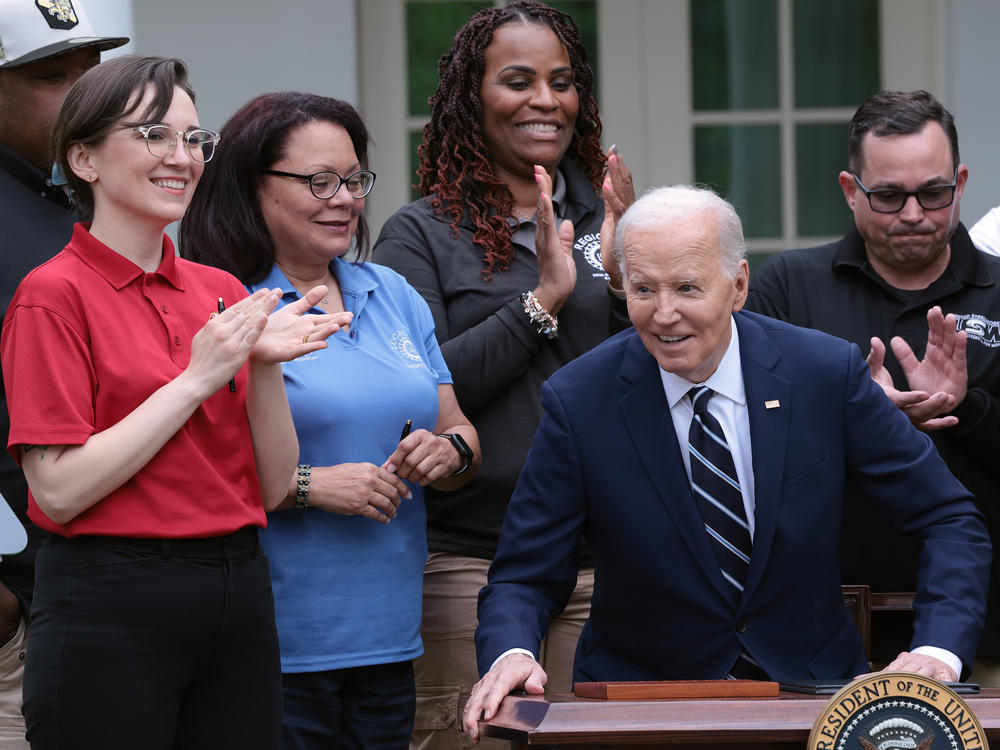Section Branding
Header Content
Biden announces new tariffs on imports of Chinese goods, including electric vehicles
Primary Content
President Biden slapped tariffs on $18 billion of imports of goods from China including electric vehicles, semiconductors and medical products to protect U.S. workers and companies in the strategic sectors and punish China for unfair trade practices.
Biden is also keeping in place the tariffs that former President Donald Trump had placed on more than $300 billion of imports from China.
Biden said the move would keep heavily subsidized Chinese products from rolling over domestic industries he is hoping to foster.
"Folks, look: I'm determined that the future of electric vehicles will be made in America, by union workers, period," Biden said.
The new tariffs come as Biden pushes forward to implement three pieces of legislation that contain hundreds of billions of subsidies to boost the domestic manufacturing and clean energy sectors — and ahead of a presidential election where trade and jobs will again be an issue.
"We know China's unfair practices have harmed communities in Michigan and Pennsylvania and around the country that are now having the opportunity to come back due to President Biden's investment agenda," Lael Brainard, Biden's top economic adviser, told reporters.
Here's a list of the new tariffs
Most of the new tariffs cover items that the Biden administration has sought to have made in America through investments in the Inflation Reduction Act, the CHIPS and Science Act and the Bipartisan Infrastructure Law.
U.S. Trade Representative Katherine Tai told Morning Edition that China heavily subsidizes its electric vehicle industry, leading to prices so low that American manufacturers could "really be crushed by what has been produced by these anti-competitive practices in Beijing."
Some increases will take place this year. They include tariffs of:
- 100% on electric vehicles, up from 25%
- 50% on solar cells, up from 25%
- 50% on syringes and needles, up from zero
- 25% on lithium-ion batteries for electric vehicles, and battery parts, up from 7.5%
- 25% on certain critical minerals, up from zero
- 25% on steel and aluminum products, up from a range of zero to 7.5%
- 25% on respirators and face masks, up from zero to 7.5%
- 25% on cranes used to unload container ships, up from 0%
Other hikes will be phased in, including:
- 50% on semiconductors, up from 25%, by 2025
- 25% on other lithium-ion batteries, by 2026
- 25% on natural graphite and permanent magnets, up from zero, by 2026
- 25% on rubber medical and surgical gloves, up from 7.5%, by 2026
Tai also told reporters that the administration is concerned about Chinese electric vehicle makers setting up factories in Mexico to evade tariffs. "Stay tuned," she warned.
The White House says this is different from Trump's approach
Trump had made tariffs on China one of his signature policy moves when he was in the White House. At first, some Democrats warned this could really hurt the economy — and that American consumers would pay the price.
Biden's team began reviewing those tariffs when he took office, and now has decided to keep them in place — though it is working on an exclusion process for machinery used by domestic manufacturers, particular in the solar industry.
"One of the challenges is once tariffs have been imposed, it is quite difficult politically to reduce them — because the affected industry tends to get used to them, like them, operate with them as baked into their plans," said Michael Froman, president of the Council on Foreign Relations, who was U.S. trade representative during the Obama administration.
The White House has tried to distinguish its strategy from Trump's approach. It points to comments made by Trump in rallies and interviews that he would broaden tariffs on all imported goods, including targeting Chinese cars, if he wins the election — something that they said would hike consumer prices. Biden's strategy is a "smarter approach," Tai told Morning Edition.
"They are designed to be strategic and not chaotic. They are designed to be effective and not emotional," she told White House reporters.
China expresses 'strong dissatisfaction'
The White House has downplayed the risk that the new tariffs could spark retaliation from China, saying that the issues have been discussed during meetings of top U.S. and Chinese officials, and were unlikely to come as a surprise.
But in an interview with Yahoo Finance, Biden said he expected some retaliation.
"I'm sure China will talk a lot about it, but the fact is China already is, what you might say is, way over, way over their skis on this," Biden said in the interview. "I think they'll probably try to figure out how they can raise tariffs, maybe on products that are unrelated."
China's commerce ministry said Beijing "firmly opposes" the decision, and said the review process had been "abused" for domestic political reasons. "China expresses its strong dissatisfaction," it said.
The decision to raise tariffs is a violation of Biden's promises "not to seek to suppress China or curb its development" or decouple from China, the ministry said. It said the action was out of step with the spirit of consensus reached between Biden and Chinese leader Xi Jinping, and "will seriously affect the atmosphere around bilateral cooperation."
"China will take resolute measures to defend its rights and interests," it said.
NPR China Correspondent John Ruwitch contributed to this report.


